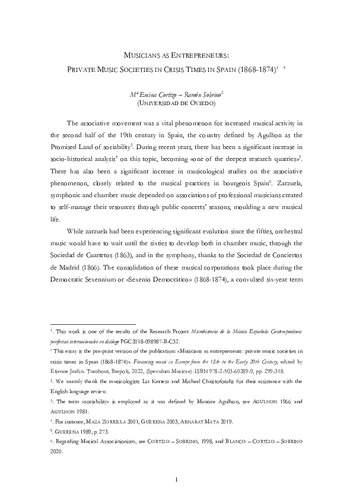Musicians as entrepreneurs: private music societies in crisis times in Spain (1868-1874)
Autor(es) y otros:
Palabra(s) clave:
Musicología.
Música española.
Asociacionismo musical.
Músicos como empresarios.
Siglo XIX.
Sociedades musicales.
Fecha de publicación:
Editorial:
Brepols
Citación:
Serie:
Speculum Musicae
Descripción física:
Resumen:
The associative movement was a vital phenomenon for increased musical activity in the second half of the 19th century in Spain, the country defined by Agulhon as the Promised Land of sociability . During recent years, there has been a significant increase in socio-historical analysis on this topic, becoming «one of the deepest research quarries» . There has also been a significant increase in musicological studies on the associative phenomenon, closely related to the musical practices in bourgeois Spain . Zarzuela, symphonic and chamber music depended on associations of professional musicians created to self-manage their resources through public concerts’ seasons, moulding a new musical life. While zarzuela had been experiencing significant evolution since the fifties, orchestral music would have to wait until the sixties to develop both in chamber music, through the Sociedad de Cuartetos (1863), and in the symphony, thanks to the Sociedad de Conciertos de Madrid (1866). The consolidation of these musical corporations took place during the Democratic Sexennium or «Sexenio Democrático» (1868-1874), a convulsed six-year term of political and social crisis from the overthrow of Queen Isabel II after the «Glorious» Revolution in September 1868, to the Bourbon Restoration in December 1874, when Alfonso XII – Isabel’s son– became the King of Spain. The right of association that is confirmed in the Constitution of 1869 , fostered the progress of the Sociedad de Cuartetos and Sociedad de Conciertos, that obtained economic benefits through the organization of public concerts of chamber and orchestral music for the first time in contemporary Spain. In this study, we will analyse the economic life of both professional societies – Sociedad de Conciertos and Sociedad de Cuartetos of Madrid –, during the Democratic Sexennium (1868-1874). Their incomes derived exclusively from the tickets sold –either through season tickets or single tickets. They lacked subsidies, and their profit margins were meagre. Through the study of the economic circumstances, we will delve into the consequences derived from economic instability for these two musical corporations, not only in relation to the influx of audiences but also in terms of economic benefits. The data will confirm the development of strategies to survive the crisis, such as the summer concerts of the Sociedad de Conciertos, less artistically demanding and much more profitable from the economic point of view, which would bring extraordinary benefits in the worst years of the crisis.
The associative movement was a vital phenomenon for increased musical activity in the second half of the 19th century in Spain, the country defined by Agulhon as the Promised Land of sociability . During recent years, there has been a significant increase in socio-historical analysis on this topic, becoming «one of the deepest research quarries» . There has also been a significant increase in musicological studies on the associative phenomenon, closely related to the musical practices in bourgeois Spain . Zarzuela, symphonic and chamber music depended on associations of professional musicians created to self-manage their resources through public concerts’ seasons, moulding a new musical life. While zarzuela had been experiencing significant evolution since the fifties, orchestral music would have to wait until the sixties to develop both in chamber music, through the Sociedad de Cuartetos (1863), and in the symphony, thanks to the Sociedad de Conciertos de Madrid (1866). The consolidation of these musical corporations took place during the Democratic Sexennium or «Sexenio Democrático» (1868-1874), a convulsed six-year term of political and social crisis from the overthrow of Queen Isabel II after the «Glorious» Revolution in September 1868, to the Bourbon Restoration in December 1874, when Alfonso XII – Isabel’s son– became the King of Spain. The right of association that is confirmed in the Constitution of 1869 , fostered the progress of the Sociedad de Cuartetos and Sociedad de Conciertos, that obtained economic benefits through the organization of public concerts of chamber and orchestral music for the first time in contemporary Spain. In this study, we will analyse the economic life of both professional societies – Sociedad de Conciertos and Sociedad de Cuartetos of Madrid –, during the Democratic Sexennium (1868-1874). Their incomes derived exclusively from the tickets sold –either through season tickets or single tickets. They lacked subsidies, and their profit margins were meagre. Through the study of the economic circumstances, we will delve into the consequences derived from economic instability for these two musical corporations, not only in relation to the influx of audiences but also in terms of economic benefits. The data will confirm the development of strategies to survive the crisis, such as the summer concerts of the Sociedad de Conciertos, less artistically demanding and much more profitable from the economic point of view, which would bring extraordinary benefits in the worst years of the crisis.
ISBN:
Patrocinado por:
Proyecto de Investigación del Plan Nacional: "Microhistoria de la Música Española Contemporánea: periferias internacionales en diálogo". PGC2018-098987-B-C32.
Colecciones
- Capítulos de libros [6536]
- Historia del Arte y Musicología [500]
- Investigaciones y Documentos OpenAIRE [8421]
Ficheros en el ítem




